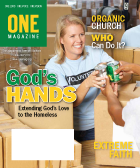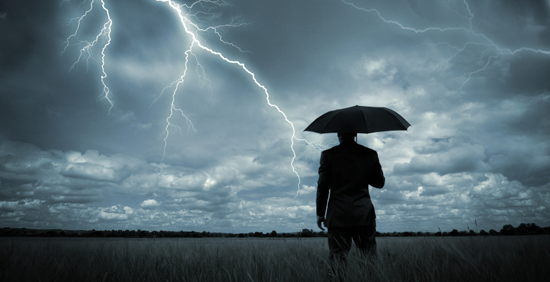
June-July 2013
God's Hands
------------------
|

First Glimpse
Storms
I will never forget my first big storm as a youth pastor. Along with my young wife and 12 teens, I found myself three miles into an East Tennessee hike when it struck full force. Wind howled, lightning struck nearby, and thunder shook the ground. Being the brave man I am, I dashed off down the wet, rocky trail along the base of a cliff, leaving my wife and youth group trailing behind.
As we rounded a sharp bend in the trail, I found a narrow cleft in the rock wall. With nowhere else to turn, I squeezed into the opening. To my surprise, I found a large, cave-like room cut into the face of the cliff. Within moments, I ushered everyone safely inside. We began to laugh at our dripping clothes as we gasped for air and celebrated our safety. For an hour, while the storm raged, we sang favorite songs and swapped tall-tales, safe in the shelter of the rock.
This treasured memory always comes back when I read Psalm 61. I am reminded David also faced storms in his life—not only physical but spiritual as well:
-
As a shepherd boy, he faced a bear and a lion…alone.
-
As a young man, he stood alone before a giant with the fate of the nation in his hand.
-
For years, jealous King Saul chased him from hiding place to hiding place until an exhausted David sought refuge among the Philistines, dreaded enemies of Israel.
-
As king, he endured decades of bloody warfare that left him unfit in God’s eyes to build a holy temple.
He lost the battle with lust, slept with the beautiful Bathsheba, and tried to cover his tracks by murdering her husband. As a result, his newborn son died, and God told David the sword would never leave his household, that his sin would echo through the generations.
Storms. How did David handle them, according to this passage?
-
He prayed in the storm (verses 1-2), a gut-wrenching, desperate plea for help. He recognized that God could hear him from the depths of despair, and he made his case honestly, holding nothing back.
-
He took shelter from the storm (verses 3-4), asking God to lead him to “the rock that is higher than I.” He acknowledged God’s sufficiency with firsthand experience. God was with him when he faced lion and bear. God stood with him before Goliath. God traveled with him through the mountains and caves a step in front of Saul and his men. God forgave quickly when he repented of his sin with Bathsheba. He had experienced God’s sufficiency, and he sought shelter again in the face of a new storm.
-
He left an example for others in the storm (verses 5-6). David expressed supreme confidence that God would keep him and preserve his heritage, his kingdom. We are living proof! David lived to see his kingdom passed to Solomon, and ultimately Jesus fulfilled David’s kingdom as a blessing to the whole world.
-
He praised God in the storm (verse 8). David’s cries of desperation gave way to shouts of praise. When we encounter a storm, and God answers our prayers in an unmistakable way, it is only natural to react with spontaneous praise. I can’t help but think of the words of the popular song:
I’ll praise You in this storm, and I will lift my hands,
For You are who You are, no matter where I am,
And every tear I’ve cried, You hold in Your hand.
You never left my side, and though my heart is torn
I will praise You in this storm.
Eric K. Thomsen is managing editor of ONE Magazine. Contact him at editor@nafwb.org.
|
|

